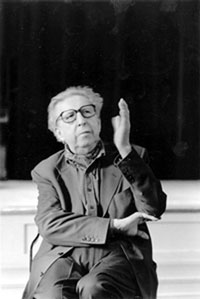Henri Dutilleux at NEC, 1997
We remember composer Henri Dutilleux (1916–2013) with this account of his 1997 composition masterclass at NEC.
Composer Henri Dutilleux (1916–2013) visited NEC in October 1997, meeting with composition students to critique their scores. This account of that visit appeared in NEC's Notes magazine for Fall 1997.
"Pour moi, la musique est une science."
 While composer Henri Dutilleux applies the precision of a scientist to his music, he is far too subtle to trap his sounds in a test tube. In Boston for the BSO's much-anticipated world premiere performances of The Shadows of Time, he stopped off at NEC for a protracted masterclass with composition students—and took off his lab coat long enough to talk about the importance of the "spirit of play."
While composer Henri Dutilleux applies the precision of a scientist to his music, he is far too subtle to trap his sounds in a test tube. In Boston for the BSO's much-anticipated world premiere performances of The Shadows of Time, he stopped off at NEC for a protracted masterclass with composition students—and took off his lab coat long enough to talk about the importance of the "spirit of play."
The French composer took the measure of his country's music in this century. The period of Les Six was a "lightweight period," stronger for the visual arts than for music. After the second World War there was "a lot at the same time—perhaps too much at the same time for young composers … a very rich period, perhaps too rich." Nowadays, relations between composers are "cordial—but distant."
For the young composers who had brought their works for his review, he had pointed comments on the human chemistry of performance. To the composer of a concerto, he explained the importance of giving the section players—not just the soloist—something to do, in order to keep the entire orchestra engaged in the piece.
Talking about his own work, he described the range of conductors, from those who invite the composer's collaboration in the honing of a performance to those who expect him to sit in a corner and just listen to a finished interpretation "like a solid block." Solidity is not without its virtues; Dutilleux noted that he relies on such mathematical "markers" as expanding intervals and a five-movement structure. "With a blank page, I need to have something solid—and that's solid."
From solidity comes freedom. Immense subtlety of colors drapes the five-limbed armature of Shadows. Its quiet close is "not a peaceful ending; it's a questioning ending." What he said of one student composer's work could be applied to his own: "At the same time, the great rigor of the past—and great freedom."
photo by Paul Foley
